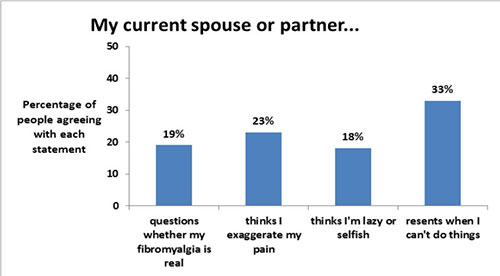Fibromyalgia Impact on Relationships
 Doctors can spend a lot of time asking people about fibromyalgia—what are your symptoms, how’s your sleep, does fibro affect doing household chores or work outside the home, does fibro keep you from attending social functions? An area, however, that’s often neglected is how fibro affects your connections with the most important people in your life—your partner or spouse, children, and close friends. So we decided to ask—does fibro affect your relationships and how? We asked, you answered, and here are the results which were published in the medical journal Musculoskeletal Care.
Doctors can spend a lot of time asking people about fibromyalgia—what are your symptoms, how’s your sleep, does fibro affect doing household chores or work outside the home, does fibro keep you from attending social functions? An area, however, that’s often neglected is how fibro affects your connections with the most important people in your life—your partner or spouse, children, and close friends. So we decided to ask—does fibro affect your relationships and how? We asked, you answered, and here are the results which were published in the medical journal Musculoskeletal Care.The National Fibromyalgia & Chronic Pain Association posted a survey online asking about fibromyalgia symptoms and the impact that fibromyalgia had on your relationships with your partner/spouse, your children, and your friends. The survey was completed by over 6000 people with fibromyalgia, making it one of the largest fibromyalgia surveys. Almost all of those completing the survey were women (96 percent) and most were between 45 and 64 years old. Here’s what you said about how fibromyalgia impacted your relationships.
How has fibromyalgia affected my relationships with my spouse/partner? Two in three of those completing the survey were married and living with a spouse or partner.
- Over one in four people reported their spouse/partner did not understand their fibromyalgia.
- Half of people said fibromyalgia had damaged a current or previous relationship with a spouse or partner.
- 10 percent of people said fibromyalgia contributed to a break-up of a relationship.
- About half of those surveyed were satisfied with their current partner or spouse.
- People with more severe fibromyalgia symptoms are less likely to be satisfied with their current partner or spouse.
- Over 70 percent of people surveyed said they had children who were old enough to understand their FM.
- One in three said their children resented when they couldn’t participate in activities with them.
- One in four said their children thought they exaggerated their pain.
On the other hand, many people shared that having fibromyalgia resulted in losing friends, as friends stopped calling and offering invitations. People with FM talked about friends not knowing how to react to fibromyalgia and some said they’d learned to stop letting people know they have FM. Many people were frustrated that FM interfered with them being able to be more involved with others and develop closer relationships.
What else did people say? Many people talked about feeling inadequate and guilty that they couldn’t invest as much time or energy into their relationships as they might like to do. This often led people to fear the people in their lives would leave them because they couldn’t commit more of their time and energy to relationships. FM often resulted in people feeling alone and isolated.
People also mentioned feeling annoyed or insulted by television commercials for fibromyalgia products that showed women taking a pill and then getting right back to everything in their lives. These images of quick fixes frustrated people with fibromyalgia who recognize improvements are usually not so quick or complete. Also, it frustrated people when their friends and family suggested that following healthy lifestyle habits – like improved diets or new exercise – would relieve their symptoms.
 What did this survey teach us? The good news from this survey is that about half of those with fibromyalgia are satisfied with their current relationships with their partners or spouses. And at least half of partners/spouses, children, and friends do believe that fibromyalgia is real and pain is not being exaggerated.
What did this survey teach us? The good news from this survey is that about half of those with fibromyalgia are satisfied with their current relationships with their partners or spouses. And at least half of partners/spouses, children, and friends do believe that fibromyalgia is real and pain is not being exaggerated.The troubling news was that there seemed to be a lot of suffering in silence, with people with FM afraid to talk to important people in their lives about their fibromyalgia. Survey results suggest that healthcare providers need to spend time talking with their FM patients about FM and then provide good information to be shared with family and friends to help foster productive and positive communications.
And if you have a friend with fibromyalgia—let them know they’re special and important to you. And just because they turned you down to go out for lunch or shopping a couple times, don't hesitate to call and ask the next time or ask for a suggested activity you might both be able to do together.




